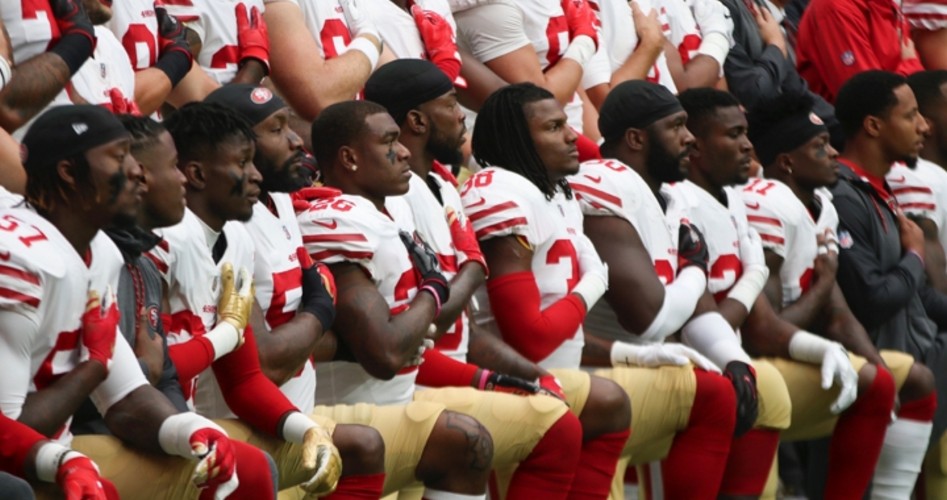Should Government Make Disrespecting the Flag or National Anthem Illegal?
The recent rush to kneel or otherwise refuse to show deference for the National Anthem among professional football players has prompted a wave of anger among Americans who find such displays deeply offensive. Military veterans in particular have voiced outrage. This new political fad began with former San Francisco quarterback Colin Kaepernick, who began refusing to stand for the National Anthem last season to protest alleged racial injustices against blacks in the United States. Other NFL players soon followed Kaepernick’s example, continuing the protests into this season. After President Donald Trump criticized the protests and opined that such players should be fired or otherwise disciplined for such behavior, the movement mushroomed into an all-out push by players and many coaches to defy the president. The latest twist in this saga saw Vice President Mike Pence walk out of a football game after players knelt for the anthem, prompting predictable howls of outrage among members of the anti-Trump media.
Such acts of disrespect toward revered national symbols are deeply offensive to many patriotic Americans. They amount to yet another instance of spoiled entertainers using their public platforms to bite the hand that feeds them — in this case, the country whose free and open society allowed them to become successful. But should such conduct be illegal?
Younger Americans might not remember a similar controversy that boiled over in the 1980s, when Ronald Reagan was president. Then, as now, virulent leftists, afraid that their faction’s death grip on America’s political and cultural institutions might be jeopardized by the Reagan administration, staged a number of demonstrations in which American flags were trampled on and burned. Then, as now, millions of patriotic Americans were outraged, so much so that a concerted effort was made to make such displays illegal. It was even proposed that the Constitution be amended to criminalize flag desecration.
But in the end, nothing came of such efforts. Flag-burning remains legal, and no serious progress was ever made toward amending the Constitution.
The reason that the flag-burning controversy produced no new laws is that flag-burning, offensive though it certainly is, is an exercise of free political speech protected under the First Amendment. While honest people may differ on how far free-speech protections extend (should they cover obscenity, for example?), there can be little question that nonviolent forms of political protest, however offensive they may be, are protected. In fact, it is broadly true that free speech is offensive speech; otherwise, the very notion of freedom of speech is pointless. The views expressed in this article and in this publication are deeply offensive to many people hostile to conservative, Americanist, or constitutionalist ideals. Without any doubt, this publication would have long since been banned were it not for the protections afforded by the First Amendment.
It is worth noting that most other Western countries, including our northern neighbor Canada, impose limits on free political speech, reserving to the state the power to criminalize “hate speech” — in other words, speech that some people find hateful. And there is a growing push to pass “hate speech” laws in the United States, a push strongly opposed by most on the “Right,” who rightly sense that such laws would be used to target them, and not their opponents on the Left. Indeed, as we have seen in recent months, “right-wing” speakers have been denied the right to speak at publicly funded universities, on the grounds that their controversial views incite hatred.
But the principle applies evenly to all sides of the political spectrum, even if the Left is far more censorious than the Right. If leftist football players — or any other people, for that matter — choose to publicly disrespect the flag, or the National Anthem, their right to do so is protected, as far as the government and laws are concerned.
However, the NFL and other private sports organizations are free to set standards of conduct for their employees and to impose penalties for violating them. Private corporations routinely establish codes of dress and conduct for their employees, the violation of which is punishable by fines, dismissal, and so forth. All such codes and standards are the right of any private organization or association — for profit or otherwise — to establish. The NFL would be perfectly within its rights to discipline or fire employees who refused to abide by the organization’s rules, including matters related to dress and conduct.
But a clear distinction must be made between the government’s authority to intervene in the National Anthem dispute (it has none), and the authority of the NFL, a private employer, to set and enforce standards of conduct for its employees, including, if it chooses, the authority to require players to stand for the National Anthem.
It might be argued that no private corporation should have the right to force someone to violate his personal moral, religious, or political convictions. Indeed, there are a welter of laws protecting a wide array of rights in the workplace, prohibiting employers from discriminating on the basis of race or sexual orientation, for example. But it is worth noting that no private corporation or other entity can “force” anyone to do anything. If a church becomes distasteful to its membership, they can worship elsewhere. If an employer treats employees unfairly, they are free to seek employ elsewhere. This sort of thing happens all the time, when people change jobs, or churches, or civic affiliations. No compulsion is involved.
Only the government has the power to compel compliance, and — unlike a private employer or a church — is not so easily exchanged for a better alternative. For this reason, government and government alone should be barred from imposing limits on personal freedoms such as speech. And public figures who choose offensive and controversial behavior are under no sanction of law — but are free to seek work elsewhere if their conditions of employment are unsatisfactory.
Photo: AP Images


